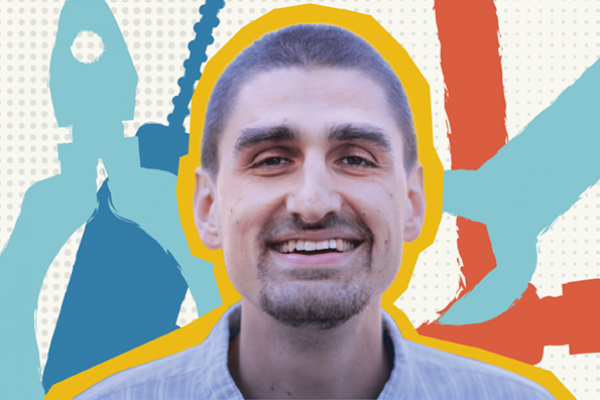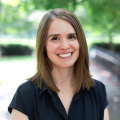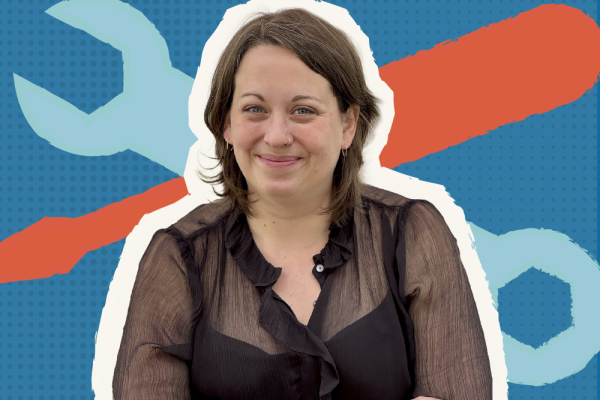This interview is part of The Reconstruct, a weekly newsletter from Sojourners. In a world where so much needs to change, Mitchell Atencio and Josiah R. Daniels interview people who have faith in a new future and are working toward repair. This week features a guest interview by Sojourners editor Betsy Shirley. Subscribe here.
Prophets and scribes: That’s the biblical tradition Jonathan Wilson-Hartgrove uses to describe his long friendship with Rev. William J. Barber II.
The prophets hardly need an introduction: They were the outspoken truth-tellers of the Bible, delivering fierce critiques of religious people who didn’t treat poor folks right. Less well known, however, are the scribes, or the skilled writers like Baruch, who recorded these prophetic zingers for posterity in Hebrew poetry (see Jeremiah 36:4).
Over nearly three decades, Wilson-Hartgrove — a self-described “preacher, author, and community builder” — has often played Baruch to Barber’s Jeremiah. Through efforts like the Moral Mondays movement and the Poor People’s Campaign, the pair has worked to articulate what they describe as a “Third Reconstruction,” reflected in an agenda that unites the nation’s poor to confront “the interlocking injustices of systemic racism, poverty, ecological devastation.”
According to Barber and Wilson-Hartgrove, when we talk about these interlocking injustices, we too often ignore that poverty isn’t just an issue for Black and brown folks, an argument they develop in their new book, White Poverty: How Exposing Myths About Race and Class Can Reconstruct American Democracy.
I talked with Wilson-Hartgrove about what it looks like to address white poverty without ignoring racial justice, how Christian anti-poverty efforts have fallen short, and what we can reclaim from the prophetic tradition — plus, a nerdy editor question some of you have occasionally asked the “scribes” of Sojourners.
This interview has been edited for length and clarity.
Betsy Shirley, Sojourners: When we say “poor folks” or “poverty” who are we talking about?
Jonathan Wilson-Hartgrove: We’re trying to redefine poverty in this book. And we think it’s important because the federal official poverty measure doesn’t capture the crisis of poverty in America. According to the official poverty measure, if you make $14,000 a year in this country, you’re not poor; but nobody can live anywhere in this country on $14,000 a year.
[The Department of Health and Human Service’s poverty threshold was $13,590 for an individual in 2022, $14,580 in 2023, and is currently $15,060.]
I’m thinking about a family I got to know who had three kids, both parents working. They were living in a van: Got up in the morning, got the kids ready for school in the van, dropped the kids off at school – both parents working near the minimum wage and can’t afford to rent a place in their town. You pick the kids up, you get dinner at a fast-food restaurant, you find a place to sleep for that night, and you do it again the next day. This is the reality for many people. [Poverty is] also folks who are doubling up with family or friends in apartments and houses. It’s people who acquire medical debt, student debt — economic challenges that make it impossible to sustain month-to-month living just because of the circumstances of life. That’s who we’re thinking about. And that’s currently [around 40] percent of people in the United States and over 50 percent of children.
[For more on how the Poor People’s Campaign measures poverty, view their latest fact sheet.]
What’s been your own proximity to poverty and poor folks?
In 2003, [my wife Leah and I] started the Rutba House in Durham as a house of hospitality. Durham is known here as the city of medicine, so we have a hospital complex connected to a university and the [Veterans Affairs] system. We’ve met a whole lot of people who have become unhoused because of medical debt.
We have welcomed people here coming out of the hospital who had nowhere else to go. We are in a historically Black neighborhood in Durham that was overpoliced and deeply impacted by mass incarceration through the 2000s. And we’ve been home to a lot of people coming home from prison and have gotten to know the way that impacts people economically.
And this is where I learned one of the myths that we really try to expose: While all people have their faults, poor people as a group are not poor because they’re lazy or because they haven’t taken initiative.
The Poor People’s Campaign that I’m part of today has grown out of efforts that we’ve been involved in for the past 15 years, an expression of what I take to be God’s spirit at work moving among people who suffer the real consequences of this poverty but know the problem is not with them; it’s the society that we live in, and it’s something that can be changed. One of the little quotes I keep on my desk is the line from James Baldwin that says, “We made the world we’re living in, and we have to make it over.”
At some point, we simply have to take responsibility for the fact that we’ve chosen this. It’s happened over time and certainly not any one person or any one group of people really made all the decisions. But we have to take responsibility for it, right? We’re trying to help people realize that, collectively, we do have the power to change this. And, as a matter of fact, anybody who cares, together with the people who are most directly impacted by this, have the power to be the largest swing vote in this country.
That’s something you emphasize in White Poverty: “We don’t lack the knowledge or resources to end poverty; we lack the moral conscience.” I hear that, but I also know there are a lot of people — Christians and others — who have tried to work towards poverty solutions… and yet here we are. What have Christians gotten wrong? Or what do we need to change?
On the one hand, I don’t want to disparage what has been done; we don’t know how much worse things could be if so many people had not worked so hard. Let’s give thanks for what has been done and acknowledge that some of those things have helped us see what’s possible. For example, just recently [during] the expansion of the Child Tax Credit in the early days of the Biden administration, child poverty — according to the federal official poverty measure — was cut in half. That’s a significant thing.
[On the other hand] the people who have inspired me in the Poor People’s Campaign — the stories that we tell in the book, people like Lakin and Stanley Sturgill in Kentucky and Pam Garrison in West Virginia — are people who have faced the violence of poverty and in the face of it have said, “We’ve got to fight not only for our lives, but for people like us, for the communities that we love.”
They’ve given themselves to organizing and building power in a way that I think should both inspire and perhaps shame the church. Because after all, if we’re in the church, we have all this: “The spirit of the Lord is on me and has anointed me to preach good news to the poor.” That’s the message of Jesus, the message of the prophets. We also have the tactics, right? Jesus’ nonviolent way of love, leading a march into Jerusalem, bringing this sort of challenge to the existing powers that’s based on the power of the people — all that’s our story.
If anything, churches that think of ourselves as progressive ought to be inspired by movements that have really sacrificed a great deal — committed a great deal — to do this work. I think we should do a serious inventory of the time we’ve invested and the budgets we’ve invested, vis-à-vis the time and the energy and the money that people have invested who have next to nothing, and see if we can give more.
You and Rev. Barber are convinced we can’t talk about racial injustice without talking about white poverty. Yet, some might hear that and wonder: “Is this a sneaky way to change the conversation from really long overdue conversations of racial injustice?” Why is it important to talk about both racial injustice and white poverty?
We’re trying to talk about white poverty as a way of getting at what racism is really about. This is not an effort to turn away from race to class; it’s an effort to really understand the way race has always been used to split poor people [and] split the kind of coalition that could change things in a democracy. If we look back over the past five years, we had awakening around racial justice in terms of multi-ethnic demonstrations, people showing up in the streets, people saying “Black Lives Matter!” together — Black, white, brown, all together saying that.
At the same time, there’s a concerted backlash against that. If you pay attention, it’s clear that the people who’ve tried to weaponize so-called “woke culture” or CRT have been playing to white people — often poor white people — saying, “If those people do better, you’re going to do worse.” This is the explicit claim of the Trump campaign right now: “Immigrants are coming — they’re going to take your jobs.” It’s always been the claim: If Black folks do better, white folks are going to do worse.
[But historically] if you look after Reconstruction, when formerly enslaved people were given some guarantees of justice, poor white people actually did better. And if you look at the data after the Civil Rights Movement, when there was action to ensure that, in a desegregated society, Black folks would do better, white folks also did better, particularly poor white folks.
I come from poor white people in North Carolina. I knew my great-grandmothers as a child; both of them were poor and were sustained in their later life by government assistance, particularly Section 8 HUD housing and government food programs — the very kinds of programs that in the ’80s and ’90s in rural North Carolina we were being told, in the name of religion, were bad. “Welfare,” as it was often derided, was taking from taxpayers and giving to lazy people. That’s the myth.
In recent years I’ve heard a lot of folks — including social justice-oriented Christians — lift up a strategy that I’ll summarize as, “Ok, let’s try to center folks of color as a way to combat the very real ways in which folks of color have been excluded from conversations that affect them.” Do you think that’s the best strategy?
White supremacy silences many voices, and we always need to pay attention to that. I’m all for lifting up Black voices, native Indigenous voices, Asian American voices — people who have been silenced. We are also saying that poor white people have been silenced, right alongside those folks. So put their voices in the mix too, right?
This is the critical piece of “moral fusion” politics: In this nation’s history, when poor white people have joined together with other people who are marginalized — [whether] by the old plantation system, or the predatory capitalism of the 20th century — that's when real change has been possible.
In this moral fusion politics where, as you’ve emphasized, people of all races share a common cause, is there space to seek recompense for folks of color — recompense that might not be for everybody? I’m thinking specifically of things like affirmative action and reparations, which have been attacked recently, partly because they’re seen as exclusive, divisive, or even “reverse racism.”
Oh, absolutely. Reparations are a key piece of our third reconstruction agenda. Reparations ask the primary agent responsible for a specific harm — that is, the federal government for the specific harm of race-based slavery — to compensate the people who have been directly impacted. It’s critically important because we can’t heal the wounds of our history until we make some sort of effort to address the harm that was created. But it’s also essential to an economy that will work for everyone. So while reparations are race-specific because our history of injustice is race-specific, I think it’s critically important for white people to understand that when reparations are paid to Black people, it will help everyone.
How so?
If we make an intentional effort to address specific harms for the descendants of slaves, that money will go into communities where poor Black people live.
I’ll tell you what the richest people in this country do with their money: They play on their private islands, and they put it in offshore accounts. [But] when poor people have money, they spend it in the local economy, right? That benefits everyone. These big corporations like to try to get pats on the back for job creation, but nothing creates jobs like poor people having money.
So that’s what I mean: Race-specific efforts to address historic harms that were race-specific, when put into practice, actually have a benefit for all people — and not just poor people, frankly. Lots of people would benefit: The people who own local restaurants, real estate agents, people who sell cars, and whatever else. But poor people are not going to buy islands. That’s what I’m saying.
I’ve got a nerdy editor question but before we get there, anything that you were hoping to talk about that I’ve missed here?
I think I would just add: Part of what I’m hoping for with this book is that white Christians will take the prophetic tradition seriously in terms of its impact on our collective spiritual well-being. I think a lot of so-called “social justice Christianity” has been very individualistic: Does this person or that person decide to join this organization or that organization? But the prophetic tradition that Rev. Barber was raised in and is writing out of in this book is fundamentally about a community. The prophetic word to us is not so much about what we might declare to somebody else or even to our government; [it’s] fundamentally about what kind of orientation would make us a different kind of people, different spaces.
I pray our churches could be spaces where the very poor and low-income people who are crying out to our government for justice would say, “These are our allies, these are our homes.” Maybe your local Presbyterian or Episcopal church doesn’t have but 20 or 30 people showing up for worship on Sunday, but what if it could become a center for the poor in your community, to organize and to build, not just political power, but to build community together, right? Share meals and have child care and education; that would be a beautiful thing for the church. And I think, in so many ways, the vitality and the future of the church depends on that.
Do you have time for my nerdy editor question?
Yeah, let’s do it.
In White Poverty, you and Rev. Barber explain why you capitalize “Black” but not “white” when talking about racial groups. We do the same thing at Sojourners, and every so often, a reader writes to us with a bee in their bonnet about it. Can you say a little more about why you made that choice?
In the book there are four chapters that try to dispel myths about the basis of race in our culture and what all gave rise to race; I hope people will read that. I think that’s important work for us to do in this moment as there’s conflict in the public square around identity connected to race.
But out of that wrestling with the history and the way race has been used to divide people, we’ve come to the conclusion that people have identity that’s connected to their people and to their place and to the ways they’ve had to negotiate the world. Those are real identities, and everybody has that.
Black folks have that in common because [of] the shared experience of trying to be human in a body that’s raced “Black” in the United States, right? So there’s a Black culture for that reason. Native folks have that as a people who experienced the colonialism that came here and had to try to survive; they have a shared experience apart from their particular tribal identities.
“Whiteness,” we’re saying, is an attempt to create an identity that will unite people to serve a system that doesn’t benefit them. And we’re trying to say that’s not an identity worth capitalizing. That’s not to say that white people don’t have culture; I’m a white person and my culture is Hillbilly culture, it’s pinto beans and cornbread and banjos and bluegrass music and the folkways that my people have shared. That’s an Appalachian identity, right? Or that's an Okie identity in a different part of the country.
So, it’s not that people with pale skin don’t have culture; it’s that whiteness is an identity that has been offered to people with pale skin [but it] doesn’t offer a culture. I don’t think you should capitalize that, but I do think people should find an identity tied to their own people, their own folkways, and embrace that identity in a way that that acknowledges their full humanity. Hence, we capitalize things like Black, or Cracker, or Redneck, but not whiteness, which is this identity that has been offered primarily to divide people.
Got something to say about what you're reading? We value your feedback!







